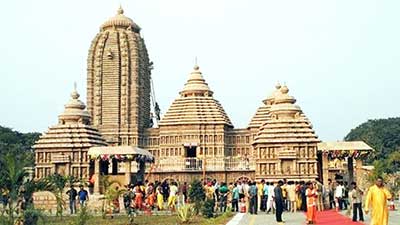Relevance: GS -1: Indian culture will cover the salient aspects of Art Forms, literature and Architecture, / GS- 2: Government policies and interventions
Key phrases: Decentralizes, Delegated, Char Dham, Aruna stambha, Devasnana Purnima, Rath Yatra
Why in News?
- The Odisha state cabinet has approved amendments to the Sri Jagannath Temple Act of 1954.
- Odisha Govt. has taken this historic step in order to simplify issues pertaining to land owned by the Jagannath Temple.
- With this amendment, the temple administration and concerned officials now have the power to sell or lease out temple land, without any approval from the state government.
Jagannath Temple Act, 1954:
- Jagannath Temple which was earlier known as Juggernaut temple by the colonial rulers. British Rulers in year 1806, issued regulations for management of the Jagannath temple.
- Under these regulations, pilgrims who visited the temple were expected to pay taxes and the British government was entrusted with appointing senior priests at the temple.
- Later the powers of management of the temple were passed on to the King of Khurdha while the colonial government continued to retain some control.
- It was only after India gained Independence that the state of Odisha formally introduced the Jagannath Temple Act in the year 1952, which came into effect in 1954.
Purpose of Amendment:
- The recent amendment decentralizes the power to settle land related issues of the temple.
- Govt. has delegated power to temple administration and concerned officials for sale and lease of land in name of Jagannath temple. Unlike earlier, no approval will be required from the state government for the process.
- The Cabinet has approved an amendment to the Section 16 (2) of the Act which implies that no prior sanction from the state government will be required for leasing out, mortgaging or selling any immovable properties owned by the temple. The temple managing committee, administrative officials and Collectors of respective districts can take decisions in this regard from now onwards.
- After this decentralization, the process which at times even took over two years for clearance, creating hurdles for people will now be expedited and be made more efficient and robust.
Jagannath Temple:
-
Construction:
- It is believed to be constructed in the 12th century by King Anatavarman Chodaganga Deva of the Eastern Ganga Dynasty.
- The temple is a part of Char Dham (Badrinath, Dwaraka, Puri, Rameswaram) pilgrimages that a Hindu is expected to make in one’s lifetime.
-
Architecture:
- This temple was called the “White Pagoda” and is a part of Char Dham pilgrimages (Badrinath, Dwaraka, Puri, Rameswaram).
- There are four gates to the temple- Eastern ‘Singhdwara’ which is the main gate with two crouching lions, Southern ‘Ashwadwara’, Western ‘Vyaghra Dwara and Northern ‘Hastidwara’. There is a carving of each form at each gate.
- The Nilachakra – Or the Blue wheel perched on top of the temple is made of eight metals or asta dhatu
- In front of the entrance stands the Aruna stambha or sun pillar, which was originally at the Sun Temple in Konark.
- Festival:
-
Mythology:
- Jagannath Puri temple is called ‘Yamanika Tirtha’ where, according to the Hindu beliefs, the power of ‘Yama’, the god of death, has been nullified due to the presence of Lord Jagannath.
-
Festivals:
- Devasnana Purnima: Annual bathing ritual, where the holy trinity has brought out from their sanctum on seated in a raised platform and bathed with purified water drawn from a well within the temple premises
- The World famous Rath Yatra (Car Festival) & Bahuda Yatra.
Sources: Indian Express , The Print , OdishaTourism.gov , IndianCulture.gov
Mains Question:
Q. Recently Odisha government has done amendment to the Jagannath Temple Act. In this context discuss the architecture, festivals and also the significance of this amendment to the local people.









